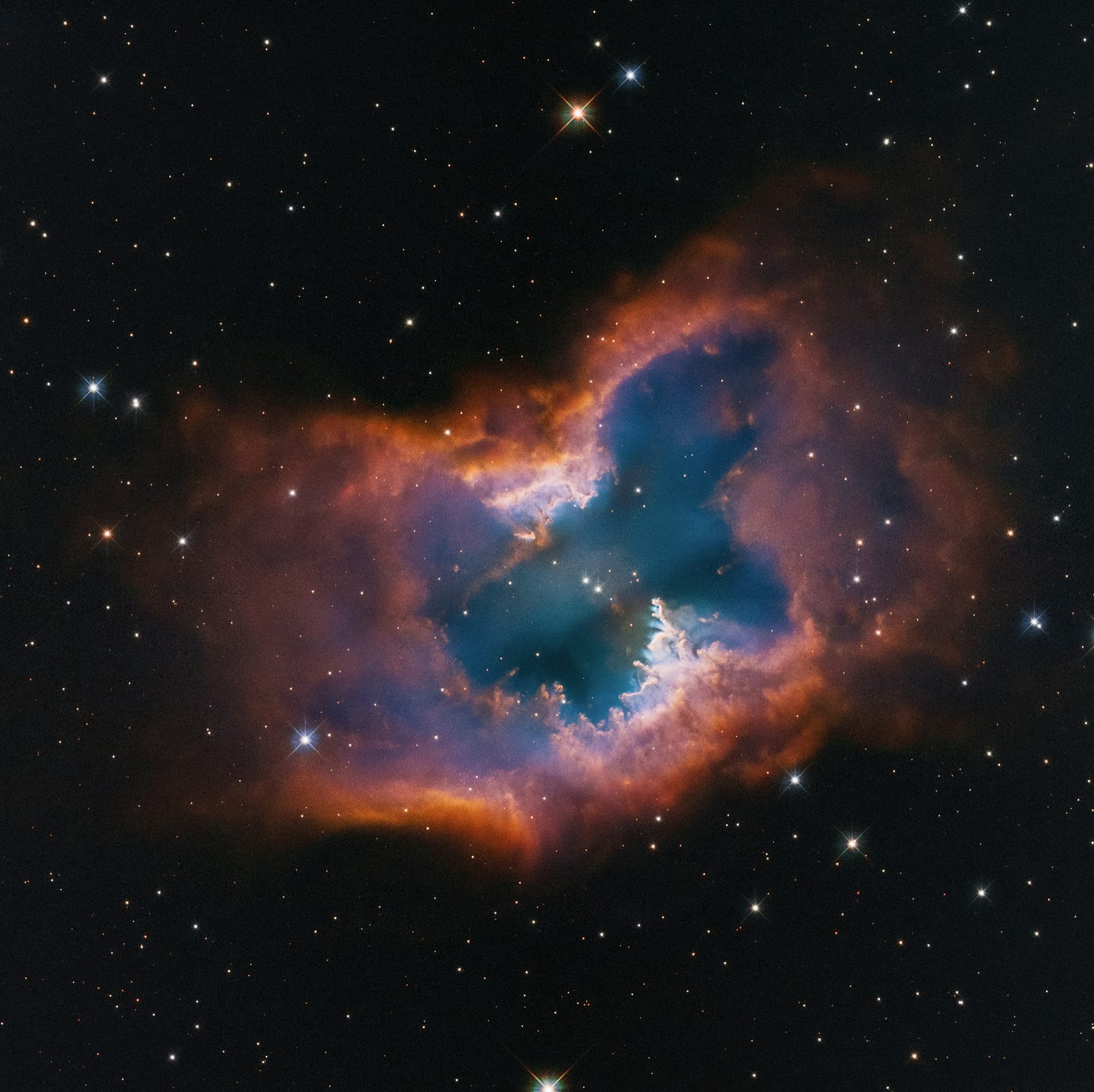Planetary nebula NGC 2899 ESA/Hubble Image
Hello to new subscribers and my faithful community of subscribers who’ve been here from the start! I really value your support for this publication and for me.
I’ve been crafting a poem this week with the theme of stardust. I checked my poetry back catalogue before writing it to find I already have at least a dozen poems which mention the topic. The idea, coined by Carl Sagan, that we are ‘Star Stuff’ has always fascinated me and I suspect it fascinates a lot of other people too. I mentioned my enchantment with the moon in a piece I wrote here a couple of weeks ago. Earth’s only real satellite was a gateway drug to the stars and the wider universe for me and I’ve read many books on cosmology, including those by Heather Couper, Patrick Moore and of course, Carl Sagan himself. When my parents would let me, I watched ’The Sky at Night’ - a British TV programme on astronomy produced by the BBC, which ran from 1957 to 2023. I also watched the Cosmos series on TV in the early 80’s and later bought a secondhand copy of the book, which I’ve read numerous times. There have been plenty of programmes in the intervening years, including the recent series ‘Universe’ by Professor Brian Cox, but Sagan’s Cosmos will always be the star for me (pun intended!) because at the time it was groundbreaking, with its mixture of special effects, science and storytelling. Carl encouraged us to have a cosmic perspective on our place in the world and it instilled a sense of wonder and grandeur to our ordinary existence. Carl Sagan says that we are ‘a way for the universe to know itself’, because we are part of the universe, made from core elements which evolved 13.7 billion years ago in stars. I find that mind-blowing and comforting in equal measure. We are made of stars and we will return to them one day. As we know, physics dictates that energy can neither be created nor destroyed - it can only be transformed or transferred from one form to another. We are made of stars you and I and we will return to them one day!
Gabriela Reyes Fuchs, photographer, artist and inventor, made an amazing discovery when she looked at her Father’s ashes under a high-powered microscope - they looked like Hubble’s images of the universe. She observed multicoloured nebula all swirls and light and colour. It’s worth having a look at her 2018 TEDx talk. A fascinating insight, which might change your views of life and death. We are not apart from the universe, we are literally a part of it, made from its core materials. So we really are part of something much bigger than ourselves - something a lot of people wish for. In the same way that we are not separate from nature, we are also part of the much bigger cosmos.
Photo by Gabriela Reyes Fuchs of her Father’s Ashes under a microscope
Space is cold and dark and as far as we know devoid of life, but the Hubble space telescope sent back images which revealed its captivating beauty. The Hubble Telescope - a joint European Space Agency (ESA) and the National Aeronautics and Space Administration (NASA) project - has made some of the most dramatic discoveries in the history of astronomy. According to the ESA Hubble website ‘from its vantage point 600 km above the Earth, Hubble can detect light with 'eyes' 5 times sharper than the best ground-based telescopes and looks deep into space where some of the most profound mysteries are still buried in the mists of time’. I find that truly magical and mesmerising.
There have been various books of Hubble photos published over the years, but at the £30 plus mark, they have always been a little out of reach for my budget. At the stunning ESA website, however, you can view some of the images taken over the last 35 years. This year is actually Hubble’s 35th anniversary of being in space and there was a new release of photos to mark the event. I’d recommend taking a look, if you have even a cursory interest in the cosmos.
I won’t bore you with my poetry now, but if you’re interested, I’ll post the poem within the next day or two. You’ll be able to check it out in the poetry section of this publication.







A lot to take in Debbie. My former logical science head has given over to the philosopher, and Joni Mitchell's song Woodstock, mediated by Matthews Southern Comfort (1970):
We are stardust, we are golden
And we've got to get ourselves
back to the garden.
Give us the poem!! 😁